The Complete Guide to The Authentic Mediterranean Diet
The complete guide to the authentic Mediterranean Diet includes everything you need to get you started: Menu and meal plans, easy and authentic recipes, shopping lists, foods to avoid, what to drink, and more- always based on science and a lifetime of experience.
By Elena Paravantes, RDN, Registered Dietitian Nutritionist, Mediterranean Diet Expert
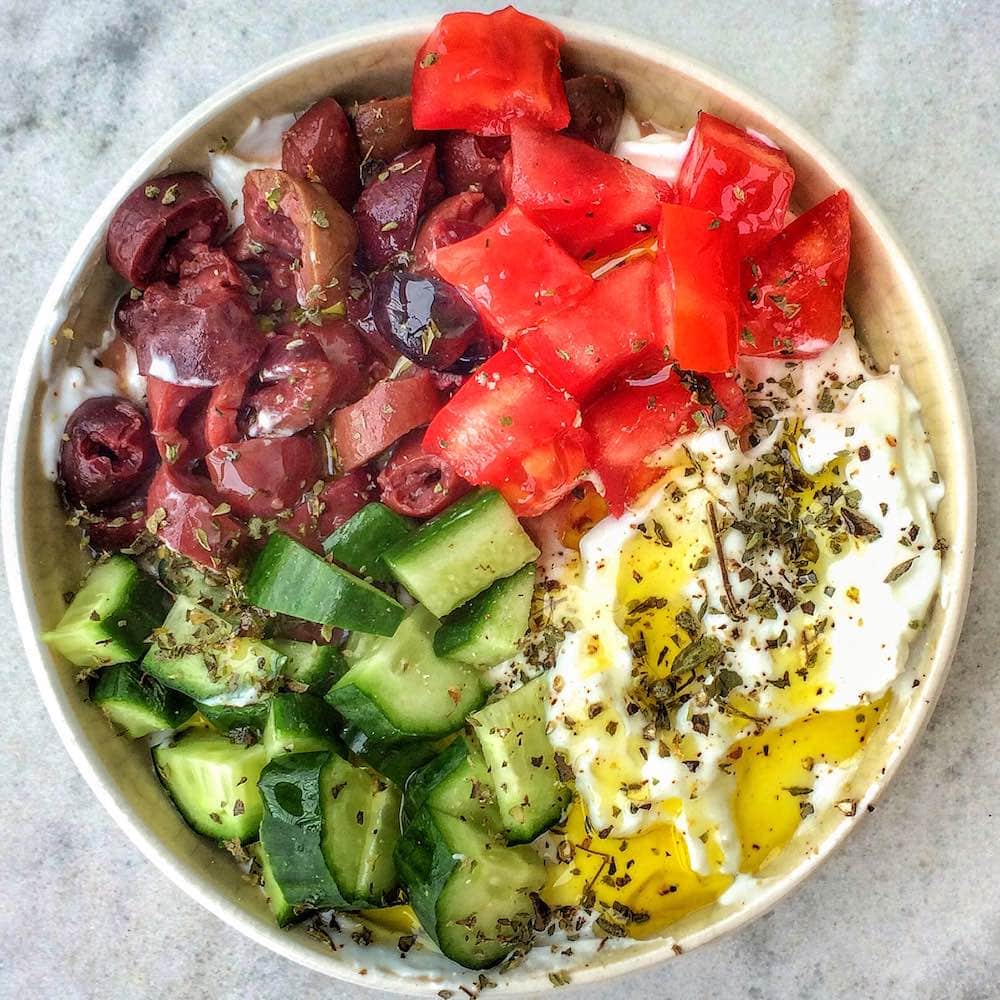
Τhe Mediterranean Diet has been characterized as the gold standard of diets. Once again it was voted best diet! Not an exaggeration, it has existed for decades in certain areas of the Mediterranean and has hundreds of studies supporting it. Initially, known as the ultimate heart healthy diet, new research has shown that its benefits are much larger. This pattern of eating may protect from cancer, help you live longer, protect your brain and even improve mood. It is also sustainable, low on the food chain and affordable.
While numerous studies (and the media) have made the diet more popular than ever, the definitions of the diet are a bit confusing and misleading. Is it the diet of all the Mediterranean or certain areas? How much olive oil are you supposed to consume? Can you eat a lot of pizza and pasta? What about the wine? Is the Mediterranean diet the same as Mediterranean cuisine? If you are looking for answers to these questions, you can find them all here at OliveTomato’s Complete guide to the Mediterranean Diet. The information you find here is not only based on science but lifelong, firsthand experience.
How to Use This Guide
Below you will find information on the origins of the Mediterranean Diet, what the diet is, guidelines, menu, shopping list, allowed foods and foods to avoid as swell as tips on how to start the diet and how to follow it when eating out. You can visit additional posts (linked below) for a complete menu plan with recipes that you can mix and match as well as a printable shopping list.
What is the Mediterranean Diet
The Mediterranean Diet reflects the food patterns typical of Crete, much of the rest of Greece, and southern Italy in the early 1960s. Dietary data from Greece and Italy show that in the recent past the inhabitants of these countries enjoyed the lowest recorded rates of chronic diseases and the highest adult life expectancy following an eating pattern like the one discussed below. It is not simply the diet of the Mediterranean region, but based on the initial scientific definition it is the diet in specific locations of the Mediterranean. The healthfulness of this pattern is corroborated by epidemiological and experimental nutrition research.
There are over 20 countries border the Mediterranean Sea with very different cultures and several differences in their diets. Many of the diets across the Mediterranean are not consistent with the Mediterranean Diet pattern even within the same country as has been noted by researchers. Scientific evidence exists mainly for the diets of of Greece, Italy and Spain, this tighter definition helps us provide more specific guidelines and thus making the diet easier to follow.
Timeline of the Mediterranean Diet
1948: The first ever study of the now known Mediterranean diet happened in Crete. In 1948 the Greek government invited the Rockefeller foundation to investigate how to raise the standard of living in post war Crete. The study was very thorough and it was discovered that the diet of the Cretans was nutritionally adequate compared to the U.S. nutrition standards. This came as surprise to the Cretans and the foreign investigators. The diet was made up of wild greens, fruit, herbs, beans, plenty of olive oil and wine with very little meat.
1958-64: Ancel Keys, the U.S. physiologist and his observations lead to the 7 countries study. He found that the typical dietary pattern of Crete in the 50’s and 60’s was associated with good health and the lowest rates of heart disease by far even though they consumed high amounts of fat, mainly in the form of olive oil. In 1961 the life expectancy of a Greek at the age of 45 was higher than any other country according to data from the Word Health Organization.
1993: The Mediterranean Diet Food pyramid was developed by a collaboration of researchers from Harvard and the World Health Organization. In essence it was the introduction of the Mediterranean diet to the American public and the authors in their report define the Mediterranean diet and the pyramid based on the research from the diets of Crete, Greece and southern Italy.
2000 and beyond: The Mediterranean Diet goes mainstream. The Mediterranean diet began gaining momentum particularly after the fat phobia of the 90’s. It has consistently ranked as the best diet and is the preferred diet prescribed by doctors and health professionals around the globe.
Basic Guidelines of the Mediterranean Diet
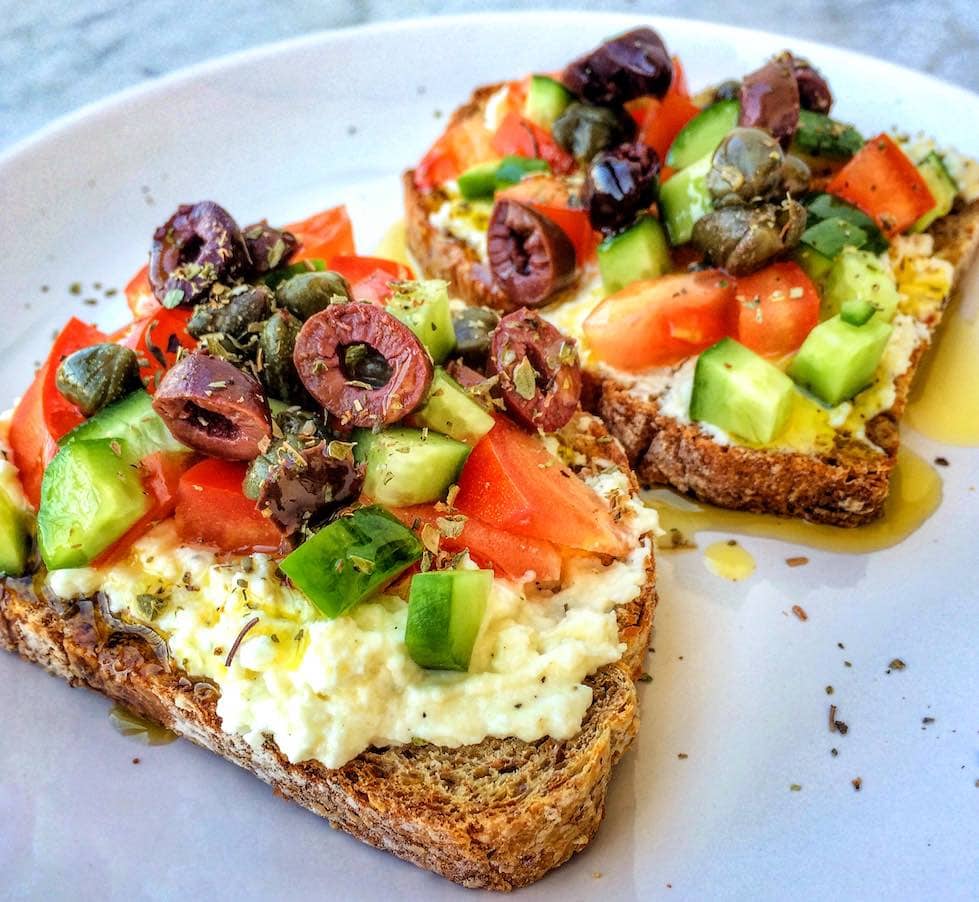
- Food is mainly from plant sources, including fruits and vegetables, beans, nuts, grains. Vegetables are the main course, meat or poultry is a side dish and is not consumed daily.
- Food is minimally processed. The meals are made up of vegetable based simple home-cooked dishes.
- Local and seasonal foods are preferred (which often maximizes the health-promoting micronutrient and antioxidant content of these foods), and is better for the environment.
- Olive oil is the main fat, replacing other fats and oils (including butter and margarine). Extra virgin olive oil is used for all cooking needs including roasting, sautéing, and baking.
- Daily consumption of low to moderate amounts of cheese and yogurt.
- Weekly consumption of low to moderate amounts of fish and poultry (recent research suggests that fish be somewhat favored over poultry); from zero to four eggs per week.
- Fresh fruit as the typical daily dessert; sweets with a significant amount of sugar (often as honey) and saturated fat consumed not more than a few times per week and usually during holidays.
- Red meat is consumed a few times per month (recent research suggests that if red meat is eaten, its consumption should be limited to a maximum of 12 to 16 ounces (340 to 450 grams) per month.
- Moderate consumption of wine, normally with meals; about one to two glasses per day for men and one glass per day for women.
- The true Mediterranean Diet is a moderate carbohydrate diet (about 40% carbohydrates) with moderate to slightly elevated fat (35-40%).
Mediterranean Diet Food List
* For a complete printable shopping list you can see our post here:
Vegetables
Seasonal and local vegetables. Do not buy imported “Mediterranean” vegetables, try and consume what is local and seasonal in your area cooked in olive oil and tomato usually, and consumed as a main course. You may have on hand some frozen vegetables such as peas, spinach and green beans when you cannot access fresh produce. Eat: At least 6 servings a day
Fruit
Local and seasonal fruit are consumed either after a meal or as a snack. It should be noted that studies show that citrus fruit are an important source of antioxidants. Eat: 2-3 a day
Dairy
The main sources of dairy is regular fat cheese and yogurt. Goat and sheep cheese is often consumed. Eat: 2-3 servings a day
Meat and Poultry
Red meat is generally consumed once a week and chicken once a week. Meat is not the main course, unless it is a holiday or celebration. Eat: Red meat once a week, Chicken once a week
Fish and Seafood
Local and small fatty fish is the main type of fish consumed. It ca also be canned. Eat: 2 servings a week.
Grains and Bread
The Greek-Mediterranean diet is not a high carbohydrate diet, in fact nutrition analysis show that only 40% of calories come from carbs. They most common carb is bread. Bread accompanies all the vegetable dishes. Once a week there will be a dish with pasta, and rice is often mixed with vegetables such as in spinach rice or leek rice. Eat: 3 slices of bread or rusks a day, Pasta once a week, others grains (part of the main course) once or twice a week.
Fats and nuts
As noted olive oil is your main source of fat, you use it for cooking, baking and sautéing. Nuts may be included in salads and some desserts or consumed as a snack. Eat: 3 tablespoons of olive oil at least a day, 3 servings of nuts a week
Beans
Beans play an important role in the Mediterranean diet. They are consumed about twice a week in the form of a stew cooked with tomato and olive oil but can be consumed cold as well or as a dip. Eat: 2-3 servings a week
Greens
Greens are a unique component of the Greek-Mediterranean diet and are important nutritionally. They are rich in antioxidants and very few calories. They are lightly boiled and served with olive oil and lemon. Eat: 2-3 servings a week
What to Drink
- Your main go-to beverage is water.
- Consume wine only with meals.
- Drink herbal beverages as they are an important part of the diet. They are great source of antioxidants and also a source of hydration. Herbal beverages such as chamomile, thyme, sage and linden are drank often and have been associated with health benefits.
- Coffee is also consumed once or twice a day.
Foods to Avoid on The Mediterranean Diet
- Vegetable and seed oils such as corn oil and canola oil. While these oils may promote themselves as heart healthy they do not contain any antioxidants (extra virgin olive oil does) and may promote inflammation. They also were never part of the Mediterranean diet.
- “Mediterranean” processed snack foods. Many companies sell snack foods such as chips, breakfast bars that may contain some ingredient that may be associated with the Mediterranean diet, however they are highly processed and often full of added sugars or vegetable oils.
- Soft drinks and other sweetened beverages. They do not even exist in the Mediterranean Diet.
- Flavored yogurts. Yogurt should only contain milk and yogurt cultures, no corn starch, gelatin, added sugars, artificial flavors.
- Ready Made Salad Dressings. Apart from the fact that many are made with unhealthy vegetable oils, even the ones containing olive oil have lost most of their nutrients (especially antioxidants) when sitting in a bottle .
Authentic Mediterranean Diet Meal Plan
You can see a sample day below, for a complete and detailed 5 Day Menu check The Mediterranean Diet Meal Plan (click the post below):
I do mention “authentic” the reason for this is that most “Mediterranean Diet” meal plans are not authentic, they are a Westernized version which will not have the same health benefits as the real thing. A Mediterranean Diet is made from whole foods, simple recipes, you will get mostly vegetables and meat is a side dish.
Mediterranean Diet Breakfast
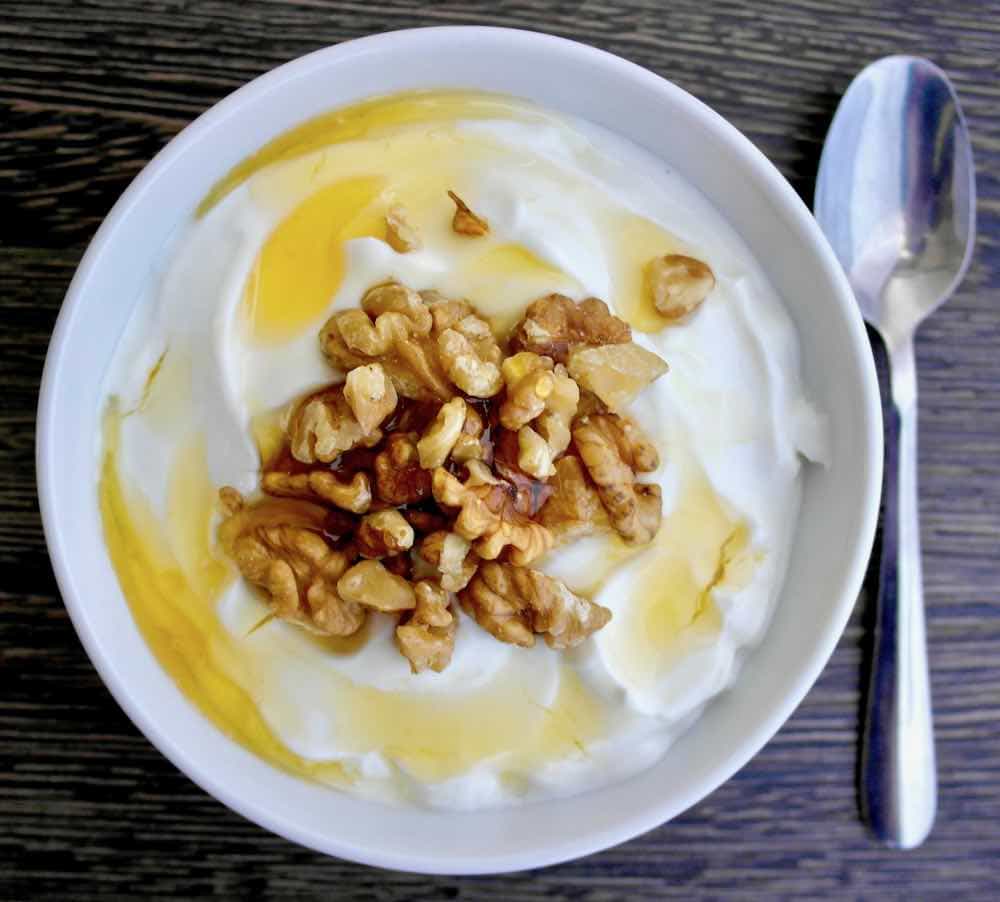
It may include coffee or a herbal tea and a rusk. For a larger breakfast it may consist of some sort of bread or a a whole grain barley rusk with cheese and olives and tomato or fruit/nuts and Greek yogurt or a piece of a savory pie such as cheese pie or spinach pie.
Mediterranean Diet Lunch
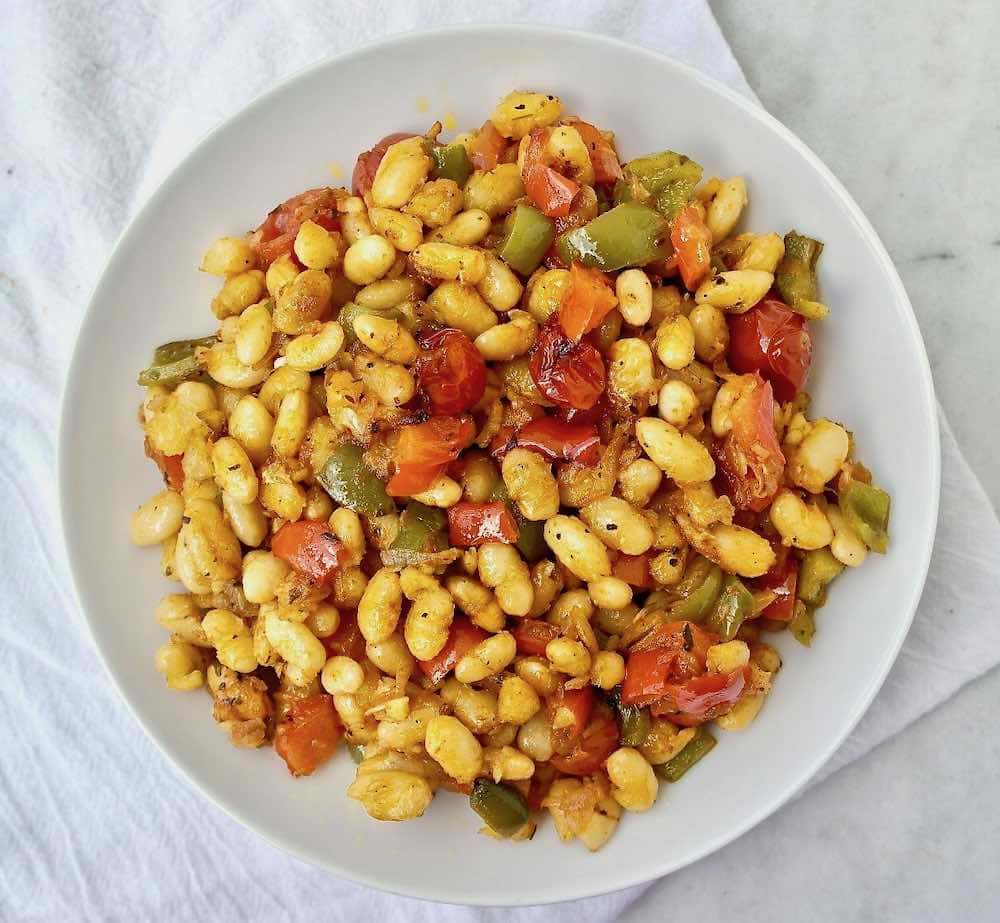
Seasonal vegetable casseroles or beans cooked with olive oil, herbs, and tomato sauce accompanied with whole grain bread and cheese.
Mediterranean Diet Dinner
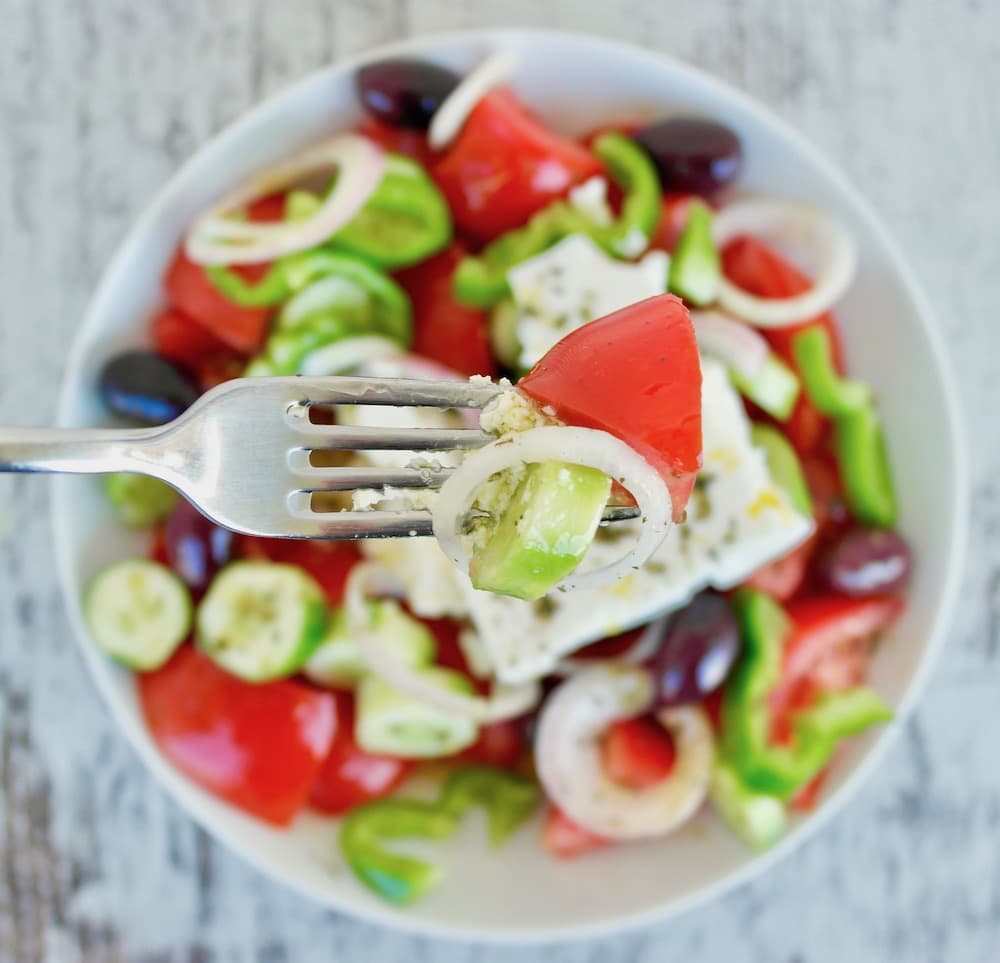
A large Greek salad with an olive oil salad dressing and feta and whole grain bread. You may accompany this with a glass of wine.
Mediterranean Diet Snacks
Snack can be quite simple: a fruit, Greek yogurt with nuts and honey, bread topped with vegetables.
How to Follow a Mediterranean Diet When Eating at Restaurants
Look at the vegetable offerings, look for roasted or grilled vegetables that can be drizzled with olive oil and balsamic vinegar, you can accompany this with grilled fish. Or you can order a large salad with a bit of cheese, some protein, nuts and ask for olive oil and vinegar on the side. Another choice are pasta dishes served with vegetables and olive oil.
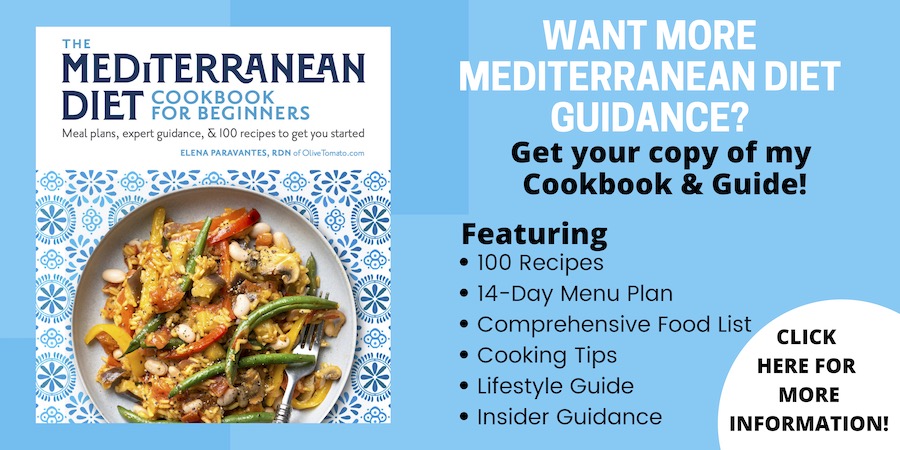
Benefits of the Mediterranean Diet
The benefits of the Mediterranean Diet are ever growing and if we look at many “new” diets, most of them are just copies of the original Mediterranean Diet. The main difference is that the Mediterranean Diet is the only diet that has been studied extensively and has hundreds of studies supporting it.
Reduces the Risk of Cardiovascular Disease
The Mediterranean Diet is the original heart healthy diet. Heart disease was literally non-existent in certain areas of Greece and Italy back in the 60’s. Research shows that the Mediterranean diet as a whole can protect the heart even compared with conventional low fat diets and is ideal for an individual with an increased risk of heart disease.
Helps You Live Longer
The closer an individual follows the Mediterranean diet the longer they live, even if they do not live in a country in the Mediterranean region. This has been shown by numerous studies. The European Prospective Investigation of Cancer (EPIC), in which researchers gathered information on the nutritional habits of 74607 people from 9 countries. The participants were graded according to how close they followed the Mediterranean diet. For every 2 point increase there was an 8 percent decrease in mortality.
Protects from Diabetes
Due to the high intake of fiber, complex carbohydrates, fruits and vegetables and generally anti0inflammatory foods, the Mediterranean diet has been shown that it can lower the risk of type II Diabetes. Another study from Cambridge University, has shown that a diet similar to the Mediterranean diet (rich in fruits, vegetables, fish, rice and pasta) correlated with low blood sugar levels. A recent overview showed that a Mediterranean diet was better for diabetes compared to other popular diets, even low-carb ones.
Cancer Protective
The traditional Mediterranean diet is rich in substances that have protective effects such as selenium, vitamin E and C, omega-3 fatty acids, fiber, antioxidants such as polyphenols from olive oil and resveratrol from wine as well as antioxidants from herbs such as oregano and garlic. All these nutrients are associated with a lower risk of cancer, particularly prostate, breast and colon cancer.
Weight Loss
With 40 percent of calories coming from fat it you may expect that this diet can be fattening. However, we now know that fat in the diet (especially when it is good fat) is not what is making you fat. Numerous studies have shown that the Mediterranean diet is ideal for weight loss compared to a Westernized diet. And if you follow an authentic Mediterranean Diet that is a moderate carbohydrate diet (40-45% of calories) it will be even more effective. A Mediterranean Diet is the diet of choice for weight loss because it is healthy, effective and most importantly sustainable-you can eat this way for the rest of your life, it is not restrictive.
Improved Mood
In the past few years numerous studies have found an association between the Mediterranean Diet and improved mood. Researchers note that a Westernized diet can cause damage to our brain through oxidative stress, insulin resistance and inflammation. Protection from oxidative stress through food can reduce damage to our neurons. The Mediterranean Diet is composed of anti-inflammatory foods which provide protection.
Alzheimer’s Protection
Studies have shown that a Mediterranean Diet can reduce the risk of cognitive decline that may appear during the aging process. According to research, following a Mediterranean diet can slow some changes in the brain that may point to early Alzheimer’s disease.
How to Start a Mediterranean Diet
So now that you have a bit of information on the background and basics of the diet, it is time to start. Luckily this diet is easy to follow and delicious, so it will not be too hard to get started. Here are some small changes you can make today:
- Eat meat as a side dish. Red meat is limited to one serving a week, but if it’s hard to do that, how about trying to have red meat as a side, rather than a main course? You can eat red meat two times a week in this way, an example would be a vegetable casserole with 2 ounces of meat on the side.
- Use olive oil as your main source of fat and the right amount. Olive oil is the basis of the diet and many of the benefits appear to come from the good monounsaturated fats but also the polyphenols in the olive oil. However to get the benefits, you must replace other fats with olive oil, it should your main source of fat in your diet and you should make sure you are using it correctly.
- Keep cooking simple. A mistake a lot of people make when they start a Mediterranean diet is finding various “Mediterranean” complex recipes that require numerous and special or exotic ingredients, long preparation or recipes with foods that they don’t usually eat. Traditional Mediterranean recipes are usually easy and simple to make with real, seasonal ingredients that you most likely have on hand. Three starter recipes I recommend are: Greek Spinach and Rice, Traditional Green Bean casserole and One-Pot Black-Eyed Peas.
- Make an effort to eat fish (canned is OK). Most of us just don’t get enough fish in their diet. If you find fresh that’s fine, but canned, marinated and cured fish is good too, as well as frozen. It is preferable that you consume small fatty fish such as anchovies and sardines.
Save for Later and Pin It
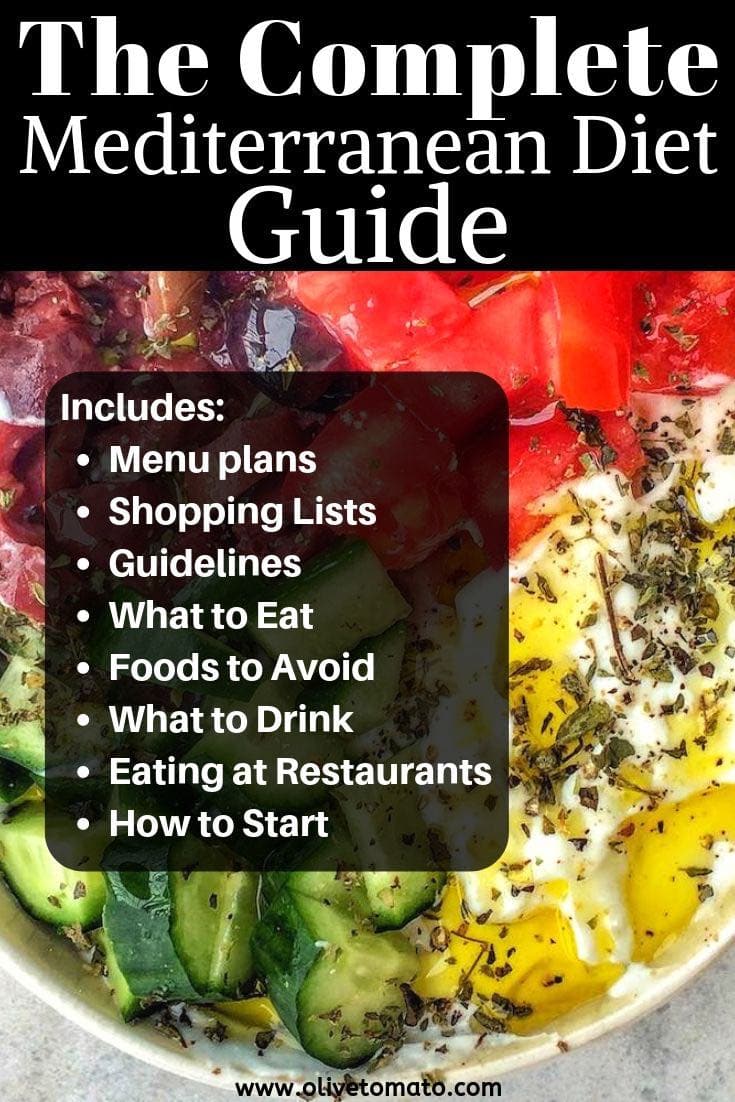
REFERENCES
- Allbaugh LG: Crete: A Case Study of An Underdeveloped Area. Princeton, Princeton University Press, 1953.Argyropoulos K, et al. Adherence to mediterranean diet and risk of late-life depression. Presented at: APA Annual Meeting; May 18-22, 2019; San Francisco.
- N S Boghossian, E H Yeung, S L Mumford, C Zhang, A J Gaskins, J Wactawski-Wende & E F Schisterman, Adherence to the Mediterranean diet and body fat distribution in reproductive aged women, European Journal of Clinical Nutrition volume 67, pages289–294 (2013)
- Davies MJ, D’Alessio DA, Fradkin J, Kernan WN, Mathieu C, Mingrone G, et al. Management of hyperglycemia in type 2 diabetes, 2018. A consensus report by the American diabetes association (ADA) and the European association for the study of diabetes (EASD). Diabetes Care 2018 Oct 4.
- Hellenic Ministry of Health and Welfare, Supreme Scientific Health Council. Dietary Guidelines for adults in Greece. Archives of Hellenic Medicine. 1999;16(5):516-524.
- Keys A: Coronary heart disease in seven countries. Circulation 1970;41(suppl):1–211.
- Keys A, Aravanis C, Blackburn H, Buzina R, Djordjevic BS, Dontas AS, Fidanza F, Karvonen MJ, Kimura N, Menotti A, Mohacek I, Nedeljkovic S, Puddu V, Punsar S, Taylor HL, Van Buchem FSP. Seven Countries. A Multivariate Analysis of Death and Coronary Heart Disease. Cambridge, MA and London: Harvard University Press; 1980.
- Lourida, Ilianna; Soni, Maya; Thompson-Coon, Joanna; Purandare, Nitin; Lang, Iain A.; Ukoumunne, Obioha C.; Llewellyn, David J., Mediterranean Diet, Cognitive Function, and Dementia: A Systematic Review Epidemiology: July 2013 – Volume 24 – Issue 4 – p 479–489
- Mancini, Joseph G. et al. Systematic Review of the Mediterranean Diet for Long-Term Weight Loss, The American Journal of Medicine, Volume 129, Issue 4, 407 – 415.
- Olubukola Ajala, Patrick English, Jonathan Pinkney, Systematic review and meta-analysis of different dietary approaches to the management of type 2 diabetes, The American Journal of Clinical Nutrition, Volume 97, Issue 3, March 2013, Pages 505–516.
- Papamichou, D. et al. Dietary patterns and management of type 2 diabetes: A systematic review of randomised clinical trials. Nutrition, Metabolism and Cardiovascular Diseases
- Renaud S, de Lorgeril M, Delaye J, Guidollet J, Jacquard F, Mamelle N, Martin JL, Monjaud I, Salen P, Touboul P: Cretan Mediterranean diet for prevention of coronary heart disease. Am J Clin Nutr 1995;61(suppl):1360S–1367S.
- Simopoulos, A. P., & Sidossis, L. S., What Is So Special about the Traditional Diet of Greece. Mediterranean Diets, 24–42, 2000.
- Schwingshackl L, Chaimani A, Hoffmann G, Schwedhelm C, Boeing H. A network meta-analysis on the comparative efficacy of different dietary approaches on glycaemic control in patients with type 2 diabetes mellitus. Eur J Epidemiol 2018 Feb;33(2):157e70.
- Tammy Y. N. Tong, Nicholas J. Wareham, Kay-Tee Khaw, Fumiaki Imamura and Nita G. Forouhi, Prospective association of the Mediterranean diet with cardiovascular disease incidence and mortality and its population impact in a non-Mediterranean population: the EPIC-Norfolk study, BMC Medicine 2016 14:135
- Trichopoulou, Antonia & Vasilopoulou, Effie & Georga, Kornilia. (2005). Macro- and Micronutrients in a Traditional Greek Menu. Forum of nutrition. 57. 135-46.
- Trichopoulou A, et al. Modified Mediterranean diet and survival: EPIC-elderly prospective cohort study, BMJ 2005; 330
- Willett WC, Sacks F, Trichopoulou A, Drescher G, Ferro-Luzzi A, Helsing E, Trichopoulos D. Mediterranean diet pyramid: a cultural model for healthy eating. Am J Clin Nutr. 1995 Jun;61(6 Suppl):1402S-1406S.
Images by Elena Paravantes © All Rights Reserved

I am on a low sodium diet due to elevated blood pressure. It seems like some of the food mentioned…. Such as cheese and canned fish are definitely not good for me.
Is avacado oil ok? I prefer the taste over evoo
Hey I’m from the foothills of North Carolina. I’m definitely a southern cook and pretty good at it. Lol. I need to eat a healthy diet. I have fibromyalgia with chronic pain. My husband has heart disease and diabetes. I’m really interested in this lifestyle eating change. Can you help? It’s not good to be easy changing from the very southern menu to the healthy Mediterranean menu But it will be worth it. I know I need the antioxidants. I also have got to get the inflammation out of my body.
With really good quality olive oil you won’t miss the butter of the southern cooking at all! Olive oil is lighter and there are so many varietals. Also, once you start using vegetables in many ways and let your creative juices flow you won’t miss the meat either promise. Explore the veggies, you won’t regret it!!!
What about using Pecan Oil?
I like it better than the EVOO
Hi. How many eggs are allowed a week?
This on her site in another location:
Eggs
Eggs play such an important role in the Mediterranean diet. As the diet had very little meat, eggs were a good form of protein and were consumed as a main meal. Eggs are generally consumed as an evening meal or even for lunch accompanied by a salad. Usually as an omelet and sometimes fried in olive oil.
I am finding recipes that list nonfat ingredients. I don’t think that is part of the plan. Real foods vs altered foods. Can you comment on this topic?
Hi Peggy, I am assuming you mean on other websites? The authentic Mediterranean diet is a moderate fat diet, traditionally you will not find nonfat versions of ingredients that normally contain fat.
Hello, this is very helpful in my journey to start a healthier lifestyle. I do have one question though, under what not to eat, you mention EVOO, but also stated it’s high in antioxidant, so on this diet, is it good or bad?
Thank you,
Kathi
Hi, Perhaps the wording is confusing (will edit that to be clear). I meant that you should avoid seed oils and vegetables oil as they do not contain antioxidants like olive oil does which IS something you should consume. Hope that clarifies.